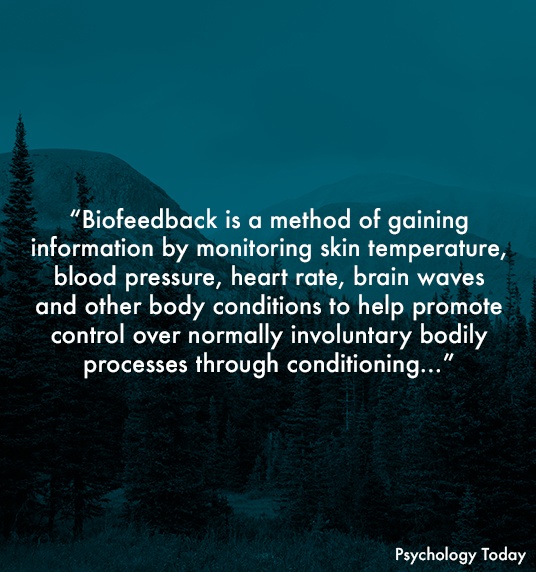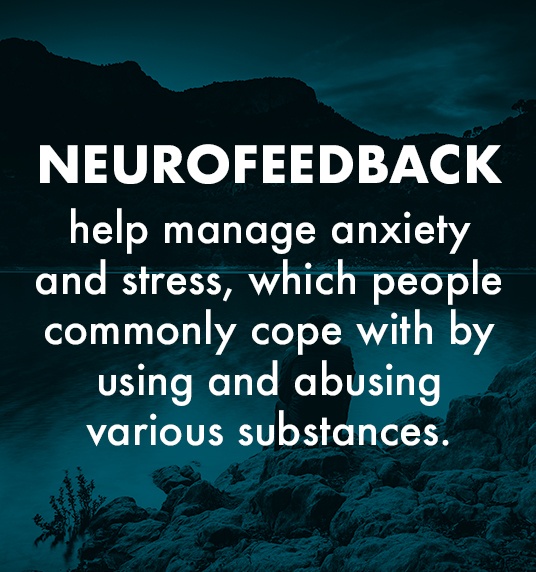Biofeedback: Neurotherapy or Neurofeedback

Nobody sets out with the intention of becoming addicted to anything. Even someone making a conscious decision to try substances is not intending to become dependent, experience withdrawal, and risk overdose or death. There are numerous factors behind addiction and it’s important for any provider to fully explore, address, and treat these factors. Treatment isn’t necessarily going to cure every issue 100%, but it should provide thorough help and give patients the ability to address issues during and after treatment. Effective treatment will address underlying causes and provide alternative ways for clients to cope with potential stressors in life. The reality is everyone will face obstacles once they are back in the world and it’s necessary to be prepared.
Neurotherapy or Neurofeedback are types of biofeedback. According to Psychology Today, “Biofeedback is a method of gaining information by monitoring skin temperature, blood pressure, heart rate, brain waves, and other body conditions to help promote control over normally involuntary bodily processes through conditioning…” By gaining control, it should be easier to manage one’s response to any triggers one faces.
HOW NEUROFEEDBACK WORKS
What appeals to a lot of people regarding neurofeedback, and other types of biofeedback, is that it’s non-invasive and painless. For many people in recovery, especially those with traumatic histories, this is incredibly important. It’s particularly helpful with mental health issues and pain, which are frequently seen when treating addiction.
Neurofeedback works by putting sensor’s on the patient’s head that measure EEG activity (brainwaves we can monitor). Patients are rewarded for positive behavior like improved concentration or reduced anxiety. Some methods involve listening to music, watching a movie, reading, or looking at a picture for a certain amount of time. A patient might watch a movie and with positive brain activity, the movie will become brighter and louder. This helps your brain learn to reach positive goals and to continue this behavior, rather than revert to the negative behaviors which likely contributed to substance abuse and addiction. The reward center is important to a lot of human behavior and has a lot to do with most things in life. Food, television, alcohol, and drugs are a handful of factors that can play a part in the brain’s reward system. Thus, it makes sense to identify and retrain how the brain reacts positively and negatively.
MountainView Recovery
5475 Mark Dabling Blvd #102
Colorado Springs, Co 80918
Contact Us Today!
MountainView Resources!
NEUROFEEDBACK AND TRAUMA INFORMED THERAPY
Neurofeedback is meant to help manage anxiety and stress, which people commonly cope with by using and abusing various substances. A number of people use substances to cope with problems in life, including traumatizing events. Many studies have shown that past trauma, particularly childhood trauma, is related to substance abuse disorders. It’s also possible for trauma to occur during and because of addiction. According to a limited study published by PLOS ONE, twenty-four sessions of neurofeedback greatly improved symptoms of post-traumatic stress disorder (PTSD). The number of sessions needed, and biofeedback techniques used, will vary depending on each patient and the severity of trauma and PTSD. Trauma informed therapy does not have to directly address trauma, but rather takes the possibility of trauma into consideration.

At Mountain View Recovery, we utilize neurofeedback and biofeedback to help clients in their recovery. We understand how important it is that we fully understand each client’s background to properly assess their needs and form a thorough treatment plan. Various biofeedback techniques work with clients with all kinds of experiences. It can help with trauma and PTSD, but someone doesn’t have to have severe trauma or PTSD for it to work. It’s likely many people in treatment will need some form of help with mental health issues, even if it’s a mild issue. Even people who seemingly have great mental health will still benefit from taking care of their mental health. Everyone should remember that there is no shame in having any mental health issues. Biofeedback is not going to be a fit for everyone and that is okay. Patients will also likely need other types of treatment. Mountain View Recovery will work with clients to assess whether neurofeedback is a viable option, and how long to utilize it.
Mountain View Recovery Treatment Programs
Patient Resources
Addiction is complex, which means treatment and long-term recovery are complex. Despite this, it shouldn’t scare anyone – patients or their loved ones. It just means that treatment and recovery both require thorough and thoughtful planning.
Outpatient Program
Our outpatient program (OP) is a transition preparatory phase. It provides a minimum of nine (9) hours of weekly outpatient treatment. This involves a minimum of one (1) hour/s individual substance abuse/behavioral health counseling per week.
Adventure Therapy
For a long time, nature has been seen as a balm to the problems we face in society. Even during pre-industrial times, people would seek out the countryside as a means to feel better. Many people have also used nature as a way to understand the world.
Trauma and Recovery
Just like physical trauma occurs, so does psychological trauma. Any number of traumatizing events occur and cause psychological trauma. A lot of people will experience trauma before or because of addiction. It’s possible for addiction to deepen…
Neurofeedback
Nobody sets out with the intention of becoming addicted to anything. Even someone making a conscious decision to try substances is not intending to become dependent, experience withdrawal, and risk overdose or death. There are numerous factors.
